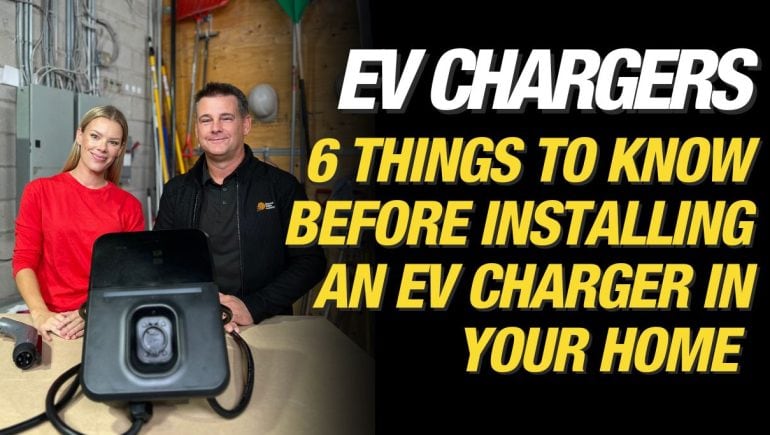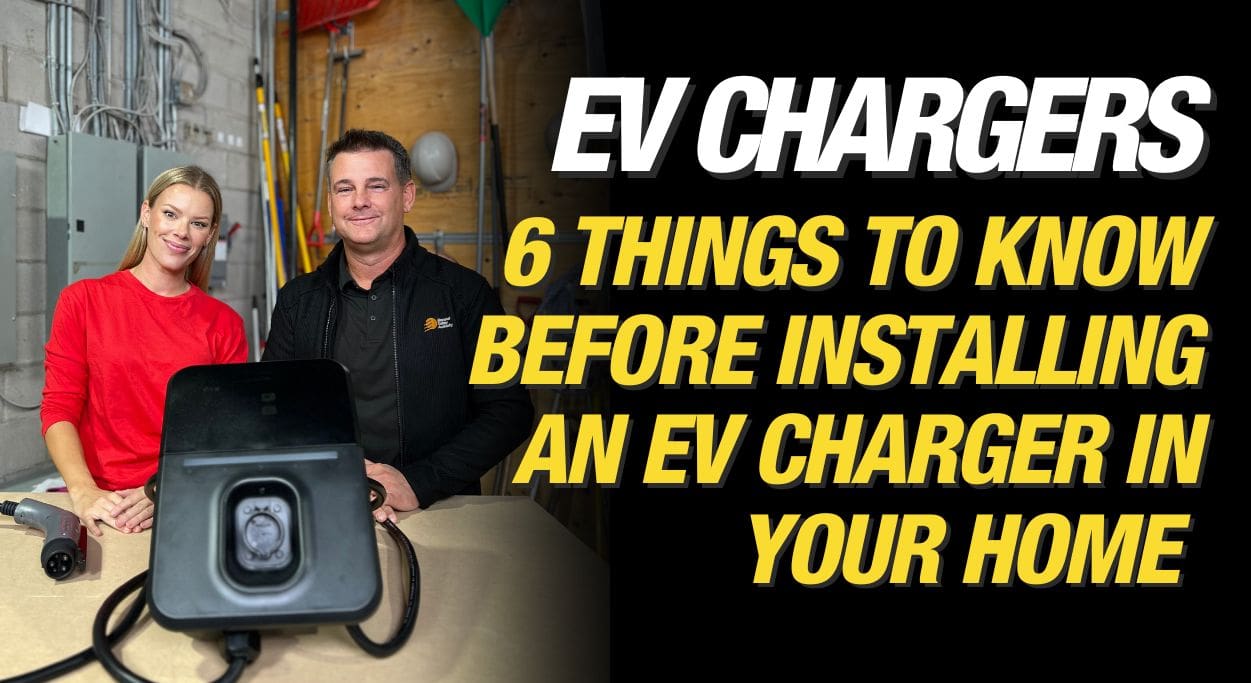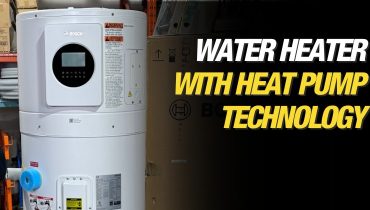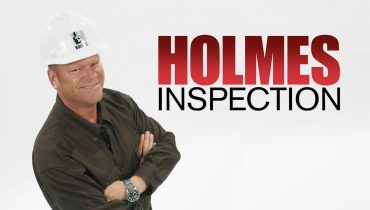Why Aren’t More Young People Choosing the Trades? There’s a serious issue facing our industry today—and it’s something I’ve been talking about for years. We simply don’t have enough skilled...

6 Things To Know Before Installing An EV Charger In Your Home In Ontario
By Sherry Holmes
Mike’s Advice / Electrical
Friday, May 31st, 2024 @ 4:31pm
If You’re Considering Installing An EV Charger, Can Your Electrical System Handle the Charge?
I am very excited to announce that my husband Blake and I just got our very first electric vehicle! I’m super excited to see how it all works out, especially with the amount of driving we both do. Over the past few years, we’ve done quite a lot of research and talked to EV owners, but one of the most important things we did was consult with Trevor Trembley, Technical Advisor with the Electrical Safety Authority.
Any new car is a big purchase but an electric vehicle adds a whole new set of things to consider. Did you know that it is estimated that by 2030 half of the vehicles sold in Canada will be electric? With the popularity of EVs increasing and more homeowners looking to get an EV Charger installed in their home, it’s important we’re all to be educated on how this will affect our current electrical systems and how to do the installation safely as this is a big load on your system.
These are the top tips you need to consider when installing an EV Charger in your home.
#1. EV CHARGER NEEDS TO BE CERTIFIED FOR USE IN CANADA
This may go without saying but you should always confirm that the charger you plan on installing is certified and approved for use in Canada. Remember, this is still relatively new technology for the average consumer so you need to be sure you are purchasing a charger that is safe and reliable and meets all the Canadian electrical standards.
The Electrical Safety Authority in Ontario helps to ensure all products sold in Ontario are certified for use in Ontario. The ESA website has a list of approved Canadian Certification marks.
PRO TIP: Discuss the requirements with your vehicle dealer but also consult with a LEC – Licensed Electrical Contractor.
RELATED
#2. CAN YOUR HOME HANDLE THE EXTRA LOAD?
Most homes have electrical service of between 100 and 200 amps. Amperage measures the volume of electricity flowing through wires. This measurement can vary from 30 amps in very old homes with no upgrades to as much as 400 amps in a very large home with extensive electric systems.
My friends at ESA tell me that the most common hazard is when people try installing the electrical vehicle supply equipment (EVSE) onto an existing panel that can’t handle the extra draw. This could potentially cause overheating and an electrical fire, and you don’t want this to happen.
RELATED
Can I plug an electric vehicle into a regular outlet in my garage?
That depends. There are different levels of charging methods and infrastructures that support them.

There are 3 Levels of EV Charging Stations.
Most EVs have a Level 1 charging cable for a standard 120-volt household outlet. This allows you to plug your EV into a regular household outlet in your garage, carport or parking space. However, the code requires a dedicated 20 amp 120-volt single receptacle for car chargers. If you need to get one installed, that requires a permit with ESA. Again, it’s important to make sure your home can once again handle that extra load.
#3 HIRE A LICENSED ELECTRICAL CONTRACTOR
As a society, we love our gadgets, but I think we often take our electrical power draw for granted. When you’re installing an EV Charger it’s a good time to get your electrical panel inspected to ensure that your house can handle the draw. Adding an EV Charger will change the draw demands and you want to ensure everything is done safely and that you are not putting your family or yourself in danger.
When you hire a licensed electrical contractor, they will assess the capacity of your electrical system by performing a load calculation. It’s also beneficial for homeowners to provide historical data on their usage for the peak demand for the last 12 months.
You can obtain historical usage data from your utility bills. Also, some utility providers have this information available on a special portal on their website. Either way, your utility provider should be able to provide historical data for the past 12 months.
If you have an existing 100-amp service you will likely need to upgrade to a 200-amp service, especially if you are at near capacity with your existing electrical demands.

Eaton EV Charger being installed on our project by Licensed Electrical Contractor (LEC) Frank Cozzolino.
Your EV will likely be the largest load on your electrical panel. It takes a while to fully charge your vehicle so to be safe you need to have the right size panel. If not, overheating or arching can occur and potentially start a fire.
HOMEOWNER TIP: I recommend getting an electrical test and trouble shoot assessment in your home every four to five years. It doesn’t take long and it gives peace of mind knowing your home is safe and up to code. It also allows the LEC to identify weak spots in your system and address them, and suggest the necessary upgrades so your home is efficient and safe. This is especially important for people with older homes (pre-1976) – please be safe and get your electrical panel inspected.
RELATED
Hiring a Licensed Electrical Contractor in Ontario: When And How
#4. ENSURE THE LEC HAS INCLUDED AN ESA PERMIT FEE IN THEIR ESTIMATE
In Ontario, the person who is doing the installation MUST get a permit from the ESA. I’m referring to the LEC or licensed electrical contractor. To ensure there is no confusion, you as the homeowner need to be aware that you MUST apply for a permit. The estimate for the work should also include the permit.
Remember, installing an EV charger is NOT a DIY job – never.
RELATED
Filing for Electrical Permits In Ontario- Why It’s Important and What Happens When You Don’t
5 Electrical Permits Myths – Understanding Electrical Permits
DON’T FORGET TO GET A COPY OF THE ESA CERTIFICATE OF ACCEPTANCE
Ask your LEC for a copy of the Certificate of Acceptance after completing the work. The ESA Certificate of Acceptance guarantees they have reviewed the work and it meets the current electrical codes and standards. Plus, it’s great for insurance and resale purposes.
#5 VERIFY THAT THE ELECTRICIAN IS ECRA/ESA LICENCED
What this means is that, in Ontario, the electrical contractor is part of the Electrical Contractor Registration Agency of the Electrical Safety Authority. This seven-digit ECRA/ESA number should be easily visible on their business card, estimate, invoice and vehicle. This number means they are licensed to do electrical work in your home. It also shows they have WSIB and insurance.
RELATED
How to Hire a Licensed Electrical Contractor For Your Electrical Work
Always do your homework and consult with a LEC to ensure you and your family are safe. That way you have peace of mind knowing you can enjoy your electric vehicle for years to come.
READ MORE
19 Biggest Home Renovation Mistakes to Avoid
THE DANGER OF DIY ELECTRICAL WORK
Electrical Considerations When Renovating (The Process)
Electrical Fire Safety Tips – How To Prevent Electrical Fires At Home









